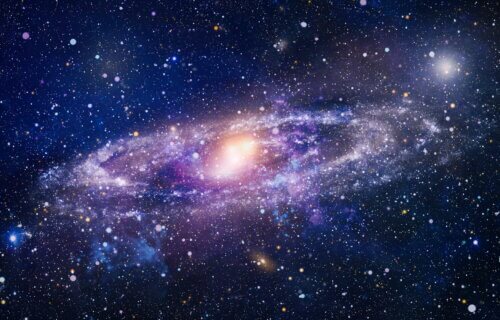WATERLOO, Ontario — Have scientists discovered a “cosmic glitch” in the gravity of the universe? That’s what a team in Canada believes after finding that Albert Einstein’s general theory of relativity doesn’t quite match up with what astronomers are seeing at the edge of the universe!
Einstein’s famous theory has been the backbone of modern physics for 100 years, helping to explain how gravity works here on Earth and out in space. Moreover, countless studies have proven this theory to be accurate over the years — confirming that gravity affects our three physical dimensions as well as the fourth dimension of time.
“This model of gravity has been essential for everything from theorizing the Big Bang to photographing black holes,” explains Robin Wen, the lead author of the project and a recent Waterloo Mathematical Physics graduate, in a university release.
“But when we try to understand gravity on a cosmic scale, at the scale of galaxy clusters and beyond, we encounter apparent inconsistencies with the predictions of general relativity. It’s almost as if gravity itself stops perfectly matching Einstein’s theory. We are calling this inconsistency a ‘cosmic glitch’: gravity becomes around one percent weaker when dealing with distances in the billions of light years.”
The study, published in the Journal of Cosmology and Astroparticle Physics, examined the possibility that the strength of gravity governing the entire universe (the cosmological gravitational constant) is slightly different than Newton’s gravitational constant that governs gravity on smaller scales, like the orbit of planets around the Sun.
“Almost a century ago, astronomers discovered that our universe is expanding,” notes Niayesh Afshordi, a professor of astrophysics at the University of Waterloo and researcher at the Perimeter Institute.
“The farther away galaxies are, the faster they are moving, to the point that they seem to be moving at nearly the speed of light, the maximum allowed by Einstein’s theory. Our finding suggests that, on those very scales, Einstein’s theory may also be insufficient.”

So, why would scientists even consider such a wild idea to modify Einstein’s revolutionary theory? It turns out some alternative quantum gravity theories like Hořava-Lifshitz gravity naturally predict such a cosmic glitch between large and small scales. The new study provides a simple way of implementing this effect like “a footnote” to the standard cosmological model.
Wen and his colleagues introduced a single new parameter called Omega_g that quantifies the difference between the cosmological and Newtonian gravitational constants. They found that current observations from the Planck satellite measuring the cosmic microwave background radiation favor a value of Omega_g around -0.01, or about a one-percent difference in the strength of gravity across cosmic scales compared to local scales.
A negative Omega_g leads to a slightly weaker gravity, driving the expansion of the universe on the largest scales. This subtle effect can slightly alleviate a couple of long-standing issues between different cosmological observations in the standard model.
“Think of it as being like a footnote to Einstein’s theory,” Wen says. “Once you reach a cosmic scale, terms and conditions apply.”
“This new model might just be the first clue in a cosmic puzzle we are starting to solve across space and time,” Afshordi adds.
The researchers caution that the existence of a cosmic glitch is not yet conclusive based on the current data. More precise measurements from future experiments mapping the cosmic microwave background and the distribution of matter throughout deep space will be required to definitively confirm or rule out this potential breakdown of general relativity at the end of the universe.
